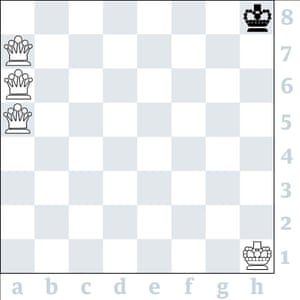The defeated challenger to Magnus Carlsen lost again in speed chess, this time to Hikaru Nakamura in the London Classic semis


Fabiano Caruana, whose challenge for Magnus Carlsen’s world crown ended in a speed chess defeat last month, has been eliminated in the $300,000 London Classic semi-final by the identical process, draws in both classical games with Hikaru Nakamura, then a heavy loss, 4.5-1.5, in rapid and blitz.
Nakamura is a specialist in fast play, so Caruana needed to make the most of White in their first classical game. Victory would also have captured Carlsen’s No 1 ranking and it looked promising when Caruana built an impressive position with queen, both rooks and a knight all aiming at Nakamura’s black king. There was a likely win by 26 g4! although the fleeting chance was harder than the Qh5 which Caruana missed in game eight of the world title match.
In theory Caruana can still become No 1 this weekend if he wins both classical games in his match for third place against Armenia’s Levon Aronian, who lost the other semi-final against France’s Maxime Vachier-Lagrave. But that will be a tall order for a player feeling a double disappointment.The games are live online, starting at 2pm.
Carlsen can now hope to keep his No 1 classical spot into the official January ranking list. The Norwegian has been there continuously since July 2011, while his total months at No 1 will then be 102, an identical number to Anatoly Karpov in the 1970s and 80s and behind only Garry Kasparov, who clocked up 255. There were no official ranking lists for the old masters, but if they had existed the stand-out candidate to rival Kasparov would be Emanuel Lasker. The German was world champion from 1894 to 1921, but was not clearly No 1 until 1896 and near the end was outshone by José Raúl Capablanca.
The £50,000 British knockout championship has also been staged this week alongside the Classic. England has six elite GMs but Nigel Short is playing in Moscow and Matthew Sadler has a career in IT, so Michael Adams, who has been No 1 for the best part of 20 years, was top-seeded ahead of David Howell, Gawain Jones and Luke McShane.
An interesting preliminary round featured two qualifiers, two rising talents, England’s two highest ranked women, the veteran John Nunn, and the former champion Jonathan Hawkins. Howell had a narrow escape against Ravi Haria, 19, who put the three-time British champion on the brink of defeat in a classical game. Howell escaped, won a speed tie-break and met Jones in one semi-final while Adams took on McShane.
Adams had seemed in good form earlier but then it all went horribly wrong. He should have won with queen against rook and bishop in classical, yet could not break down McShane’s defensive fortress. In the first rapid game Adams was White in the ultra-solid Berlin Wall butMcShane launched a fierce attack which ended with Adams’s white king checkmated at d7, deep in the black camp.
Finally Adams needed to win all four blitz games to stay in the match. He won three, but in the fourth went Qd5 to threaten mate at g2 which McShane countered by Ne7+ forking king and queen.
Why the horrific blunders, entertaining for spectators but demeaning for a career professional? The use of per move delay rather than increment, which means that a player can never accumulate time when they are blitzing at the end, would seem to be to blame.

No comments:
Post a Comment